Nissan Interstar VS Skoda Fabia – Specs, Efficiency & Price Comparison
Which model is the better choice – the Nissan Interstar or the Skoda Fabia? We compare performance (180 HP vs 150 HP), boot capacity ( vs 380 L), efficiency (7.40 L vs 5 L), and of course, the price (33300 £ vs 16600 £).
Find out now which car fits your needs better!
The Nissan Interstar (Cargo Van) is powered by a Diesel or Electric engine and comes with a Manuel or Automatic transmission. In comparison, the Skoda Fabia (Hatchback) features a Petrol engine and a Manuel or Automatic gearbox.
When it comes to boot capacity, the Nissan Interstar offers , while the Skoda Fabia provides 380 L – depending on what matters most to you. If you’re looking for more power, you’ll need to decide whether the 180 HP of the Nissan Interstar or the 150 HP of the Skoda Fabia suits your needs better.
There are also differences in efficiency: 7.40 L vs 5 L. In terms of price, the Nissan Interstar starts at 33300 £, while the Skoda Fabia is available from 16600 £.
Compare all the key specs now and find out which model fits your lifestyle best!
Nissan Interstar
The Nissan Interstar is a versatile van that expertly combines practicality with modern design. It offers a spacious interior that caters to both cargo and passenger needs, making it ideal for businesses and families alike. With its robust performance and efficient fuel consumption, the Interstar stands out as a reliable choice in the commercial vehicle market.
detailsSkoda Fabia
The Skoda Fabia presents itself as a practical and stylish hatchback, perfect for urban driving and beyond. Its interior is designed with comfort and functionality in mind, offering ample space and intuitive controls. With a focus on efficiency, the Fabia provides a smooth driving experience, complemented by its crisp and modern exterior design.
details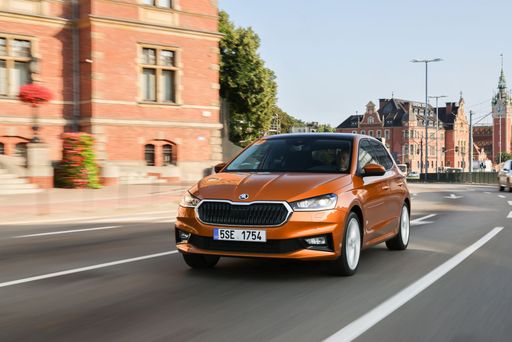 @ Skoda Presse Deutschland
@ Skoda Presse Deutschland
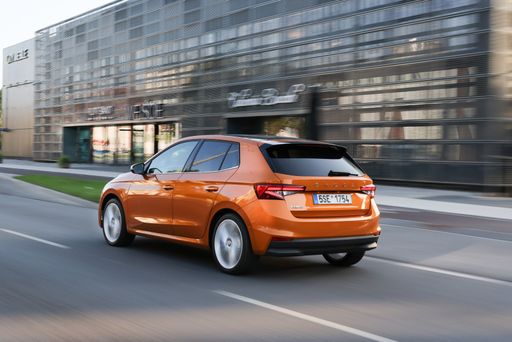 @ Skoda Presse Deutschland
@ Skoda Presse Deutschland
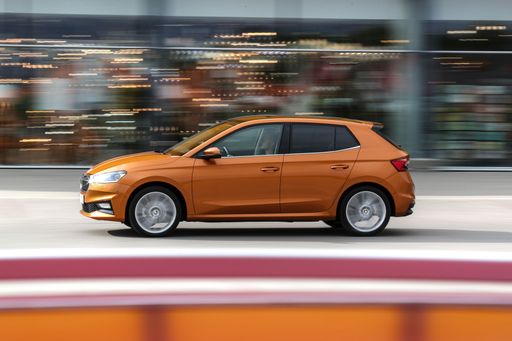 @ Skoda Presse Deutschland
@ Skoda Presse Deutschland
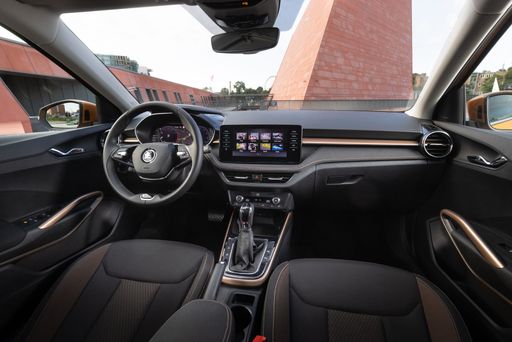 @ Skoda Presse Deutschland
@ Skoda Presse Deutschland
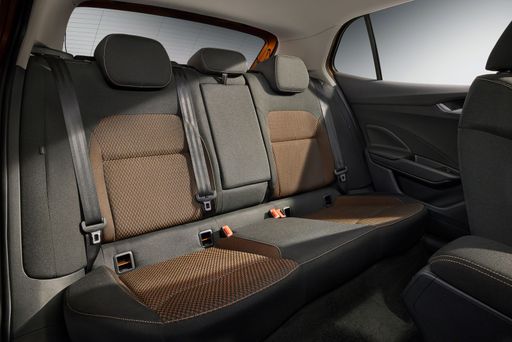 @ Skoda Presse Deutschland
@ Skoda Presse Deutschland

|
|
|
|
|
Costs and Consumption |
|
|---|---|
|
Price
33300 - 54400 £
|
Price
16600 - 25600 £
|
|
Consumption L/100km
7.4 - 7.5 L
|
Consumption L/100km
5 - 5.5 L
|
|
Consumption kWh/100km
-
|
Consumption kWh/100km
-
|
|
Electric Range
400 km
|
Electric Range
-
|
|
Battery Capacity
-
|
Battery Capacity
-
|
|
co2
0 - 195 g/km
|
co2
112 - 124 g/km
|
|
Fuel tank capacity
80 - 105 L
|
Fuel tank capacity
40 L
|
Dimensions and Body |
|
|---|---|
|
Body Type
Cargo Van
|
Body Type
Hatchback
|
|
Seats
3 - 7
|
Seats
5
|
|
Doors
4
|
Doors
5
|
|
Curb weight
1927 - 2538 kg
|
Curb weight
1116 - 1310 kg
|
|
Trunk capacity
-
|
Trunk capacity
380 L
|
|
Length
5048 - 6848 mm
|
Length
4108 mm
|
|
Width
2070 - 2222 mm
|
Width
1780 mm
|
|
Height
2307 - 2808 mm
|
Height
1459 - 1479 mm
|
|
Payload
845 - 1451 kg
|
Payload
360 - 457 kg
|
Engine and Performance |
|
|---|---|
|
Engine Type
Diesel, Electric
|
Engine Type
Petrol
|
|
Transmission
Manuel, Automatic
|
Transmission
Manuel, Automatic
|
|
Transmission Detail
Manual Gearbox, Automatic Gearbox, Automated Manual, Reduction Gearbox
|
Transmission Detail
Manual Gearbox, Dual-Clutch Automatic
|
|
Drive Type
Front-Wheel Drive, Rear-Wheel Drive
|
Drive Type
Front-Wheel Drive
|
|
Power HP
105 - 180 HP
|
Power HP
80 - 150 HP
|
|
Acceleration 0-100km/h
-
|
Acceleration 0-100km/h
8 - 15.7 s
|
|
Max Speed
120 - 177 km/h
|
Max Speed
175 - 225 km/h
|
|
Torque
300 - 400 Nm
|
Torque
93 - 250 Nm
|
|
Number of Cylinders
4
|
Number of Cylinders
3 - 4
|
|
Power kW
77 - 132 kW
|
Power kW
59 - 110 kW
|
|
Engine capacity
1997 - 2299 cm3
|
Engine capacity
999 - 1498 cm3
|
General |
|
|---|---|
|
Model Year
2021 - 2024
|
Model Year
2024
|
|
CO2 Efficiency Class
G, A
|
CO2 Efficiency Class
D, C
|
|
Brand
Nissan
|
Brand
Skoda
|
Nissan Interstar
The Evolution of the Nissan Interstar
The Nissan Interstar has long been a staple in the commercial vehicle sector, known for its robust build and practical design. The latest iterations have further cemented its status with a range of technical enhancements and innovative features aimed at aiding businesses in achieving optimal efficiency. Whether you're navigating city streets or traversing the highways, the Interstar stands out as a reliable workhorse ready to meet various transport needs.
Power and Performance
The current range of Nissan Interstar models boasts diesel engines ranging from 105 to 180 PS, offering a commendable blend of power and fuel efficiency across the board. With a fuel consumption of between 7.4 and 7.5 litres per 100 kilometres, these vehicles are designed to minimise operational costs while maximizing performance.
All models feature four-cylinder engines, with engine displacement between 1997 and 2299 cm³, capable of producing torque figures between 330 and 400 Nm. These specifications ensure that the Interstar offers superior pulling power, which is particularly useful for transporting heavy loads across different terrains.
Transmission and Drive Options
Versatility is at the heart of the Nissan Interstar, with transmission options including both manual and automatic gearboxes. Drivers can also choose between front-wheel and rear-wheel drive configurations, allowing the vehicle to suit specific logistical requirements or personal preferences.
For those seeking simplicity and ease of use in urban environments, the Interstar with its automated gearshift provides a smooth driving experience, reducing driver fatigue and increasing focus on the road ahead.
Dimensions and Load Capacities
The Nissan Interstar is available in various lengths, from 5048 mm to an extensive 6848 mm, catering to diverse commercial needs. With widths ranging from 2070 mm to 2222 mm and heights from 2307 mm to 2808 mm, the Interstar offers multiple configurations to maximise cargo space and accommodate various loads.
With a maximum payload capacity of up to 1451 kg, businesses can rest assured that the Interstar is more than capable of delivering goods efficiently without compromising on safety or comfort.
Innovation and Technological Features
While functionality remains a priority, Nissan has not skimped on technological advancements. Among the innovations included are advanced safety features, such as anti-lock braking systems (ABS), electronic stability control (ESC), and a variety of sensors to assist with parking and reversing.
In terms of driver comfort, the brand offers multiple trim levels with exceptional interior features designed to enhance driver experience during long hauls. Options such as climate control, advanced navigation systems, and modern infotainment setups are available, ensuring that both driver and passenger remain comfortable and connected, regardless of the journey length.
Coachwork and Trim Options
The Interstar line-up provides a range of trim levels and equipment lines, from the entry-level Visia to the high-spec Tekna, catering to different market demands and individual preferences. The selection allows buyers to prioritise features that best suit their operation or driving style.
For example, the N-CONNECTA variant offers an array of added extras, enhancing both connectivity and comfort for drivers who rely on the vehicle as a mobile office.
Conclusion
The Nissan Interstar represents a harmonious blend of power, efficiency, and technological innovation in the large van segment. With its vast array of options and features, the Interstar is undeniably a top choice for businesses looking to invest in a dependable and adaptable commercial vehicle. As the line-up continues to evolve, the Interstar remains poised to meet the growing challenges and demands of the modern logistic landscape.
Skoda Fabia
The Skoda Fabia: Precision Meets Practicality
The Skoda Fabia has long been a favourite in the compact car segment, and the 2024 version continues to uphold its reputation for delivering a perfect blend of efficiency, performance, and affordability. With a fresh design and advanced technological innovations, the Fabia is set to impress both new drivers and loyal enthusiasts alike.
Under the Bonnet: Engine Specifications
At the heart of the Skoda Fabia lies a range of efficient petrol engines tailored to meet diverse driving needs. The engine line-up includes three-cylinder and four-cylinder options, offering power outputs between 80 PS to 150 PS, corresponding to 59 kW to 110 kW. These engines strike an ideal balance between spirited performance and fuel economy, boasting consumption rates between 5 to 5.5 litres per 100 km, depending on the variant.
Transmission Options: Manual and Automatic
Drivers can choose from manual or automatic transmissions based on their preference for driving dynamics. The manual gearbox provides a traditional, engaging driving experience, while the advanced automatic dual-clutch transmission (DSG) offers seamless gear changes for a more relaxed commute.
Design and Dimensions: Compact Yet Spacious
The Fabia's exterior design remains quintessentially Skoda—sharp, elegant, and functional. The car measures 4108 mm in length, 1780 mm in width, and stands 1479 mm tall. Despite its compact footprint, the interior is surprisingly spacious, comfortably seating five and providing a commodious boot space of 380 litres.
Performance Metrics: Speed and Agility
Acceleration varies between 8 to 15.1 seconds for a 0-100 km/h sprint, with a maximum speed of 179 to 225 km/h, making it a versatile choice for urban and highway driving. Furthermore, the front-wheel-drive system ensures excellent traction and handling in various road conditions.
Fuel Efficiency and Environmental Impact
Skoda continues its commitment to sustainability with the Fabia, achieving CO2 emissions between 113 to 124 g/km. These figures not only highlight the vehicle's eco-friendly credentials but also result in lower running costs for the consumer, making it an astute financial choice.
Trim Levels and Customisation
The Fabia is available in six distinct trim levels: Drive, Essence, Selection, Drive DSG, Monte Carlo, and Monte Carlo DSG. Each variant offers its own set of features and customisation options, allowing buyers to tailor the vehicle to their specific taste and lifestyle needs.
Conclusion: A Compact Car with Much to Offer
In conclusion, the Skoda Fabia stands out in the compact car segment with its remarkable balance of performance, practicality, and affordability. With prices ranging from €19,320 to €29,840, it offers great value for money, appealing to a wide range of car buyers seeking reliability and innovation in their daily drive.
The prices and data displayed are estimates based on German list prices and may vary by country. This information is not legally binding.
